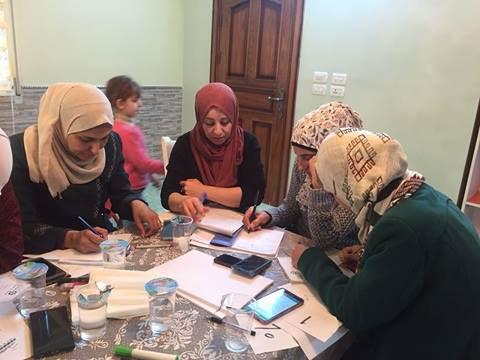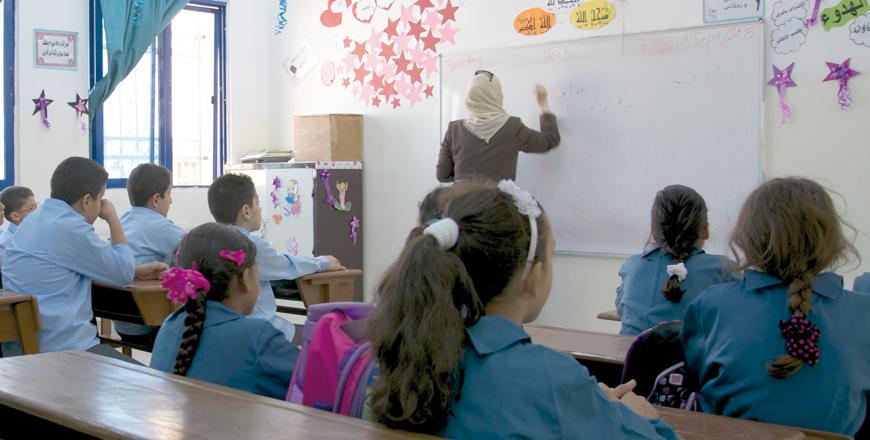You are here
Female teachers at private schools urge gov’t to stand by minimum wage promises
By Camille Dupire - Feb 01,2018 - Last updated at Feb 11,2018

Female teachers meet to review their strategy in Amman in early January (Photo courtesy of Stand Up with The Teacher campaign)
AMMAN — "Through this campaign, we have challenged the status quo and shown that female teachers are an important part of the community who can achieve their ambitions and objectives," said Sajida, a teacher from Irbid who helped launch the Stand Up with the Teacher campaign two-and-a-half year ago.
Started in 2015 with the support of The National Committee for Pay Equity (NCPE) and the International Labour Organisation (ILO), the campaign aims to help female teachers working in private schools ensure that their basic labour rights are respected, according to the campaign organisers.
"In Jordan, it is a common practice for private schools to pay women teachers less than the national minimum wage of 220JD per month," said Nisreen Haj Ahmad, co-founder of Ahel, the Jordanian organisation supporting the campaign.
"In November, the Education Ministry promised these women that they would finally receive their salaries directly on their bank accounts, as a response to their campaigning action called 'My pay in the bank'," she told The Jordan Times, stressing "so far, we have not witnessed any concrete action in that regard and we want the public institutions to know that they are not
giving up”.
A teacher in Irbid where the movement started, Heba Abu Ghneim said: “There are many schools in Irbid, Madaba, Karak, Ajloun, Jerash and Zarqa which do not comply with the new minimum wage of JD220. If that happens, we try to make a formal complaint or to work with a mediator to solve the issue.”
However, she explained, it does not always work and the number of complaints remains incredibly high, compounded by other issues such as the summer salary or maternity leaves.
“The problem with the summer salary is that the duration of the contract in the first year is 10 months. Therefore, the teacher is not entitled to the summer salary. Even if they renew their contract, they will be asked to resign in May and to sign a new contract in September so the school doesn’t have to pay salaries, social security and so on over the summer,” she told The Jordan Times.
Multiple challenges to address
According to several teachers, including Hadeel Kiswani, who works in Amman, schools always find alternative ways to circumvent this issue.
“If they are forced to pay the summer salary, they will make us work during the summer, or between semesters through the summer club,” she explained, stressing that “this often involves tasks beyond our job description or overtime which we are not compensated for”.
To counter that issue, Ahel has helped the women, who have over 3,000 members registered in their campaign, to set up the “My pay in the bank” action.
“When these women are paid in cash, they sometimes receive as little as $90 per month instead of the minimum JD220. If the money has to be transferred on their accounts, it will be trackable and schools will not be able to circumvent the law,” said Haj Ahmad, noting that the campaign also helped reduce the number of illegal termination of contracts for pregnant or women on maternity leave.
Despite several attempts by The Jordan Times, administrators of private schools refused to comment on the issue.
The Social Security Corporation and Ministry of Labour also voiced their support to the campaign, meeting regularly with their representatives over the past two years.
A growing network of solidarity
Started with 12 core members in the Irbid Governorate, the Stand Up campaign has now expanded to Amman, Zarqa, among others, and count some 300 active members, in addition to the 3,000 women registered in the campaign’s database.
“My entry into the campaign increased my ability to defend my colleagues and, most importantly, gave me tools to defend the right of women to work, It also prompted me to establish a new nursery project that helps provide women stability and continue working even when they have children,” said Najah Al Natour from Irbid.
Although they acknowledge the many benefits they got from this campaign, participants still voice their fear regarding job security. “We are still afraid by the lack of protection for teachers who dare to object to abuses,” said Natour, adding: “We have seen several women withdrawing from the campaign because of that or refusing to join because of their lack of confidence”.
However, many women have changed their attitude towards their employers, with Iman Al Madhoun saying “I have learned a lot about my rights and the importance of not giving them up. I developed the spirit of volunteerism and realised that every person can have an impact on society and will always see the results in the end.”
“Even when it is hard to see the results of your struggle, you need to continue believing that you will have an effect and that you are a starting point for others anyhow,” she continued.
For Ahel’s co-founder, this strength and solidarity is “admirable” and is the reason behind the sustainability of the campaign. “These women have built strong leadership capacities and strategic skills which is what makes their strength and will help them achieve their goals,” she said, urging the government to continue supporting these women in their action.
“We have heard promises, now we are waiting for concrete actions and measures to implement real change,” she concluded.
Related Articles
AMMAN — The “Stand with the Teachers” campaign members drumming up support from stakeholders as they appeal to Minister of Education Omar Ra
AMMAN – Violation of teachers’ rights at private schools continues to be “flagrant”, but thanks to a community-led campaign, educators are “
AMMAN — Each time the school’s owner lowered teachers’ salaries, he would say: “If you don’t like it then leave.


















